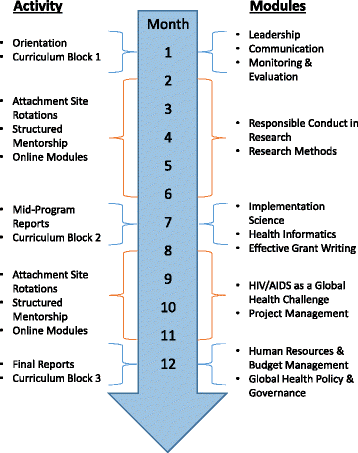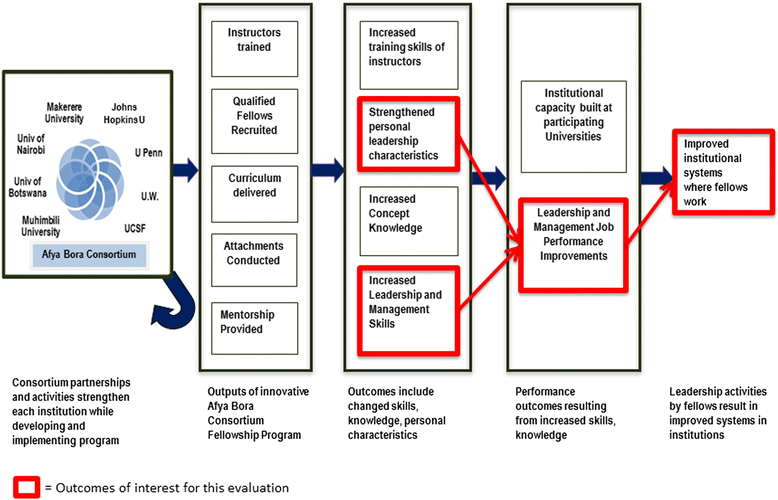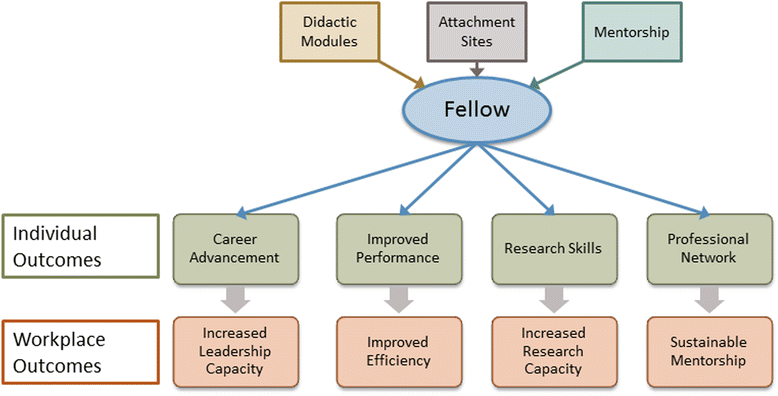Training tomorrow's leaders in global health: impact of the Afya Bora Consortium Fellowship on the careers of its alumni
- PMID: 27643589
- PMCID: PMC5028919
- DOI: 10.1186/s12909-016-0750-x
Training tomorrow's leaders in global health: impact of the Afya Bora Consortium Fellowship on the careers of its alumni
Abstract
Background: Effective leadership is a cornerstone of successful healthcare delivery in resource limited settings throughout the world. However, few programs in Africa prepare healthcare professionals with the leadership skills vital to the success of the healthcare systems in which they work. One such program, the Afya Bora Consortium Fellowship in Global Health Leadership, has been training health professionals since 2011. The purpose of this study was to assess what career changes, if any, the Afya Bora Fellowship's alumni have experienced since completing the fellowship, and to describe those changes.
Methods: The Afya Bora Fellowship is a multidisciplinary, one-year training program that teaches health professionals leadership skills through didactic and experiential learning in four African countries. Between January 2011 and June 2013 the consortium trained 42 nurses and doctors. In November 2013, an electronic survey was sent to all alumni to assess their performance in the workplace post-fellowship.
Results: Thirty-one (74 %) of 42 alumni completed surveys. Twenty-one (68 %) reported changes to their position at work; of those, sixteen (76 %) believed the change was due to participation in the fellowship. All alumni reported improved performance at work, and cited the application of a wide range of fellowship skills, including leadership, research, communication, and mentoring. Twenty-six (84 %) alumni spearheaded improvements in their workplaces and almost all (97 %) remained in contact with colleagues from the fellowship. Among the respondents there were five publications, nine manuscripts in preparation, and three international conference presentations.
Conclusions: Afya Bora alumni overwhelmingly reported that the one year fellowship positively influenced both their work and career trajectory. Training health professionals in leadership skills through didactic modules with the opportunity to apply learned skills at attachment sites in the Afya Bora Fellowship has an impact on performance in the workplace and the potential to improve long-term institutional capacity.
Keywords: Africa; Interprofessional; Leadership training; Transformative leadership; Transprofessional.
Figures
Similar articles
-
Interprofessional Fellowship Training for Emerging Global Health Leaders in Africa to Improve HIV Prevention and Care: The Afya Bora Consortium.J Assoc Nurses AIDS Care. 2016 May-Jun;27(3):331-43. doi: 10.1016/j.jana.2016.01.009. Epub 2016 Feb 4. J Assoc Nurses AIDS Care. 2016. PMID: 27086192 Free PMC article.
-
The Afya Bora Fellowship: An Innovative Program Focused on Creating an Interprofessional Network of Leaders in Global Health.Acad Med. 2017 Sep;92(9):1269-1273. doi: 10.1097/ACM.0000000000001856. Acad Med. 2017. PMID: 28723811 Free PMC article.
-
Global health leadership training in resource-limited settings: a collaborative approach by academic institutions and local health care programs in Uganda.Hum Resour Health. 2015 Nov 18;13:87. doi: 10.1186/s12960-015-0087-2. Hum Resour Health. 2015. PMID: 26581196 Free PMC article.
-
Creating a Global Acute Care Surgery Fellowship to Meet International Need.J Surg Educ. 2017 Sep-Oct;74(5):780-786. doi: 10.1016/j.jsurg.2017.01.012. Epub 2017 Apr 17. J Surg Educ. 2017. PMID: 28427944 Review.
-
The Impact of Postgraduate Leadership Development Fellowships for Doctors-in-Training: Reflections from a Fellow's Experience and a Narrative Literature Review.Br J Hosp Med (Lond). 2024 Sep 30;85(9):1-11. doi: 10.12968/hmed.2024.0144. Epub 2024 Sep 24. Br J Hosp Med (Lond). 2024. PMID: 39347674 Review.
Cited by
-
Evaluating Academic Mentorship Programs in Low- and Middle-Income Country Institutions: Proposed Framework and Metrics.Am J Trop Med Hyg. 2019 Jan;100(1_Suppl):36-41. doi: 10.4269/ajtmh.18-0561. Am J Trop Med Hyg. 2019. PMID: 30430978 Free PMC article.
-
Strengthening research capacity through an intensive training program for biomedical investigators from low- and middle-income countries: the Vanderbilt Institute for Research Development and Ethics (VIRDE).BMC Med Educ. 2022 Feb 14;22(1):97. doi: 10.1186/s12909-022-03162-8. BMC Med Educ. 2022. PMID: 35164739 Free PMC article.
-
Linking leadership development programs for physicians with organization-level outcomes: a realist review.BMC Health Serv Res. 2023 Jul 21;23(1):783. doi: 10.1186/s12913-023-09811-y. BMC Health Serv Res. 2023. PMID: 37480101 Free PMC article. Review.
-
AFYA BORA CONSORTIUM FELLOWSHIP: a journey of success in Global Health Leadership Training.Afr Health Sci. 2021 May;21(Suppl):i-ii. doi: 10.4314/ahs.v21i1.1S. Afr Health Sci. 2021. PMID: 34447427 Free PMC article. No abstract available.
-
Building health system capacity to improve maternal and newborn care: a pilot leadership program for frontline staff at a tertiary hospital in Ghana.BMC Med Educ. 2019 Feb 11;19(1):52. doi: 10.1186/s12909-019-1463-8. BMC Med Educ. 2019. PMID: 30744625 Free PMC article.
References
-
- Mullan F, Frehywot S, Omaswa F, Buch E, Chen C, Greysen R, Wassermann T, Abubakr DEE, Awases M, Boelen C, Diomande MJMI, Dovlo D, Ferro J, Hailemlak A, Iputo J, Jacobs M, Koumare AK, Mipando M, Monekosso GL, Olapade-Olaopa EO, Rugarabamu P, Sewankambo N, Ross H, Ayas H, Chale SB, Cyprien S, Cohen J, Haile-Mariam T, Hamburger E, Jolley L, Kolars JC, Kombe G, Neusy AJ. Medical schools in sub-Saharan Africa. Lancet. 2011;377(9771):1113–1121. doi: 10.1016/S0140-6736(10)61961-7. - DOI - PubMed
-
- World Health Organization. Working together for better health. World Health Organization (WHO); 2006. http://www.who.int/whr/2006/en/. Accessed 15 July 2015.
-
- World Health Organization. Transformative scale up of health professional education: an effort to increase the numbers of health professionals and to strengthen their impact on population health. World Health Organization (WHO); 2011 http://www.who.int/hrh/resources/transformative_education/en/. Accessed 15 July 2015.
-
- Frenk J, Chen L, Bhutta ZA, Cohen J, Crisp N, Evans T, Fineberg H, Garcia P, Ke Y, Kelley P, Kistnasamy B, Meleis A, Naylor D, Pablos-Mendez A, Reddy S, Scrimshaw S, Sepulveda J, Serwadda D, Zurayk H. Health professionals for a new century: transforming education to strengthen health systems in an interdependent world. Lancet. 2010;376:1923–1958. doi: 10.1016/S0140-6736(10)61854-5. - DOI - PubMed
MeSH terms
Grants and funding
LinkOut - more resources
Full Text Sources
Other Literature Sources
Medical


 =Outcomes of interest…
=Outcomes of interest… 

